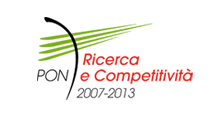Results to date: 28/07/2014
SEGUI IL PROGETTO
The project intends to support innovation in the transport sector and in the sector of energy demand in buildings. To this aim, ecological transport will be supported and promoted as well as the optimisation of interaction between energy demand in buildings, unplanned production from renewable energy sources (FER) and energy accumulation, and the definition and installation of actions aimed at energy saving.
An integrated electric mobility/production of energy from FER/accumulation/management system will therefore be proposed which will act in parallel on logistics, improvement of distribution circuits, management of available energy sources and will allow more penetration of production from FER, more security in the service of electricity provision, more elasticity of request with consequent reduction of energy prices. The fields of experimentation identified are directed towards the integration of alternative sustainable mobility systems (Intelligent Transport Systems-ITS) through the employment of an ICT platform oriented to services, infrastructure and electrical propulsion vehicles. The ICT platform will be capable of managing the various functions in a smart way and distributing services to citizens through smart devices. The testing phase, following the research activity, will be carried out in the Sicilian region where it will be possible to test and demonstrate the results obtained in the field of mobility, logistics, intelligent buildings, smart grid, energy efficiency and production of electrical energy from FER. Furthermore a Smart Planning Lab will be made available to the administrations adhering to the project, which will allow for the results of the research to be divulged and the PPAA to be supported in the innovation process so that Smart Cities may be populated by Smart Citizens capable of making full use of the results and new services proposed. Through the optimisation of nodes of exchange, access to cities, the provision of technological support and the digitisation of logistical platforms, the systems will be made usable, simple and organised to improve quality of life and facilitate the Administration's tasks. With regard to technologies present on board vehicles the research will be oriented towards the application of innovative accumulation systems, Fuel Cells (FC) and hybrid powertrain architecture (Range Extender) capable of guaranteeing more autonomy. At the same time the testing will concern the development of systems of production from FER with advanced technologies of electrochemical accumulation and systems of production/hydrogenous stockpiling capable of integrating with electric/hybrid vehicles, with the Smart Grid and with the ICT platform (Services Centre). A "life cycle thinking" approach will be adopted which will permit the evaluation of the technological services under consideration throughout the entire life cycle. In this context the Life Cycle Assessment (LCA) methodology will represent a tool of scientific relevance for the definition of the eco-profile of FER. As a further consequence, the new Smart Grid model will be at the basis of planning the urban functions from a spatial and temporal point of view with the aim of directing the modification of the model of energy consumption towards more efficient profiles.
The results are identified for the following objectives:
OR1: Smart Planning Lab
- Involvement of institutional partners and construction of shared data banks
- Analysis of mobility and logistics systems already present in the testing territories and comparison with the demands of citizens (supply/demand curves)
- Identification of areas for parking exchange, infrastructure, plants and logistical platforms
OR2: Mobility Cluster
- Identification of types of vehicles and specific techniques for prototypes: a Minibus with about 20 places and a Delivery-Van with a load capacity of 2 pallets/trip
- Determination of independence of vehicles (about 150 km for the Minibus and 90 km for the Delivery-Van) and identification of the hybrid configuration range extender on battery and FC for the minibus and of the purely electrical configuration for the delivery-van
- Determination of variables necessary for the construction of simulation models relating to the benefits of testing
- Applicative web-based preparation for intelligent parking management
OR3: Smart Building and Infrastructure Cluster
- Characterisation of electrical, thermal and refrigerating needs of a building at the University of Palermo
- Development of an SW of analysis of the question aimed at control
- Development of a statistical model for foreseeing profiles of the energy consumption of the building throughout the year
- Analysis relating to the type, classification and characteristics of Market Led and System Led Demand Response programmes
- Identification of Demand Response strategies and specific actions
- Creation of tests of natural materials and identification of parameters relating to phenomena of thermal exchange of a green roof
- Study of the state of the art of intelligent poles aimed at planning a sub-system "public lighting node" with information-energy functions
OR4: Production and management of electrical energy from FER
- Configuration and sizing of the prototype plant for electrical energy generation from FER, of the energy accumulation section and of the production, storage and distribution of hydrogen section
- Evaluation of energy needs (electrical/hydrogenous) of vehicles: Hydrogen: V(H2)=52,5 Nm3; Electrical: E=150 kWh
- Definition of the micro-network on which all the innovative plants will insist who will communicate among themselves with the aim of optimising the production of electrical energy from FER and reducing exchanges with the network
OR5: Electromechanical accumulation systems
- Tests of various innovative batteries
- Sizing of the Battery Energy Storage System (BESS) on domestic/residential scale and integration with the SOLAR DEC at the University of Palermo
- Study of V2G electrical recharge columns for laboratory testing
OR6: Infrastructure and ICT solutions for smart grid and ITS
- Study and definition of architecture of the network and services platform
- Identification of interactions between Services Centre and devices/plants relating to other ORs with the aim of activating communication for the monitoring and management of devices
- Analysis of data from connected Smart Devices, definition of elaboration policies
OR7: LIFE CYCLE ASSESSMENT - LCA
- LCA of a solar hybrid system - photovoltaic, a solar-heating/cooling plant, natural material "kenaf", green covering, co-generative biomass heating, DSSC system, micro-wind turbine
- Elaboration of a methodology for the traceability of the carbon footprint through hybrid Input-Output/LCA methodology
- Definition of a set of indicators focused on the bankability and "Jessicability" of the project
- LCA for the evaluation of energy-environmental services of batteries with sodium-nickel chloride cells
Go to presentations






 Storify
Storify twitter
twitter YouTube
YouTube